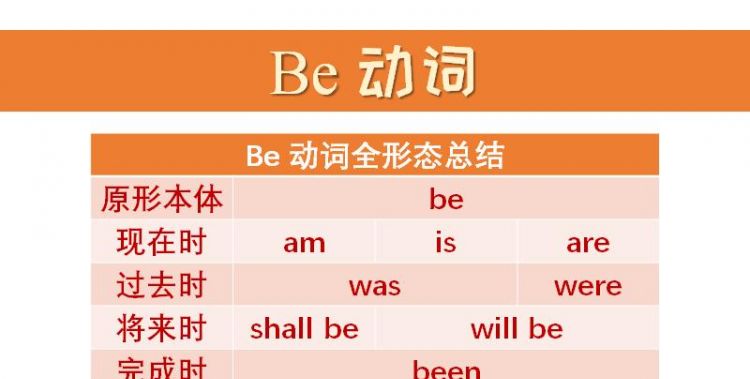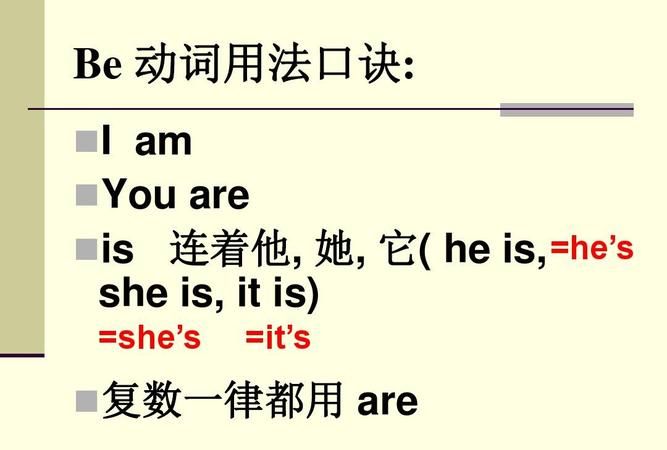本文目录
助动词do和be动词的用法
最常用的助动词有:be, have, do, shall, will, should, would
***/eng/pub/yufac/0503.htm
实意动词用法:
***/view/908811.htm
***/question/10870878.html
BE动词的用法:
be
[bi:]
vi
现在时 I am, you are, he is, we are, you are, they are (缩略式 I'm, you're, he's, we're, you're, they're), (否定缩略式 I'm not, isn't, aren't), 过去时 I was, you were, he was, we were, you were, they were (过去时否定缩略式 wasn't, weren't), 过去分词 been, 现在分词 being

be动词与助动词的用法有什么区别
它们有本质区别。
1. be动词,既可以是联系动词,也可以是助动词。
❶ 联系动词,后接名词、非谓语动词、形容词、数词、代词、副词、介词等作表语,且有各种时态变化:
一般现在时am\is\are\
一般过去时was\werer
完成时has\have\had\been
将来时用be原形
现在分词being
过去分词been
没有被动语态
He is a well-known artist.他是一位著名的艺术家。(名词)
The student has been here for hours.这个学生来这里好几个小时了。(副词)
My ambition is to become a scientist when I grow up.我的大志就是长大当科学家。(不定式)
When he was eleven, he graduated from that school.他11岁时就从那所学校毕业了。(数词)
❷ 助动词,用于进行时和被动语态。
进行时:
现在进行时am\is\are+现在分词
过去进行时was\were+现在分词
将来进行时助动词+be+现在分词
完成进行时助动词+been+现在分词
He is reading now.他在看书。
I was doning my housework when he came.他来的时候我在做家务活。
He has been learning English ever since last year.从去年到现在他一直在学英语。
被动语态:
一般现在时am\is\are+过去分词
一般过去时was\were+过去分词
将来时助动词+be+过去分词
完成时助动词+been+过去分词
进行时只有现在进行时和过去进行时才有被动语态:
现在进行时am\is\are+being +过去分词
过去进行时was\were+being +过去分词
The room is cleaned every day.房子每天打扫。
He was criticized yesterday by his teacher.他昨天挨他老师批评了。
The building is being built now by the builders.建筑工人正在建这栋建筑物。
The machine has been fixed, working properly again.进去修好了,又在正常运转中。
2. do作为助动词,用于一般现在时的否定句、疑问句中,肯定陈述句不出现。有时也用于肯定陈述句中对谓语动词进行强调。祈使句中也用do表示强调或表示否定。一般现在时第三人称单数要用does形式。
He doesn't get up early every day.他每天起床不早。
Do you often go shopping after breakfast every morning? 你每天上午吃早饭后去购物吗?
Do sit down please.请坐!
Don't sit here doing nothing.别坐在这里无所事事。
He often does work hard every day.他每天的确努力工作。

一般现在时be动词和助动词的用法
1、be动词的用法。
be
am
/
is
are
现在时
was
were
过去时
单数
复数
英语中,be动词选用单数还是复数,要由主语来定,主语是单数,就用单数,反之用复数。
◆
句中含有be动词时:
肯定句:
主语+be
+
其他
否定句:
主语+
be
+
not
+
其他
一般疑问句:
Be
+主语+其他
+?
特殊疑问句:
疑问词(what
/
who
/
when
/
where)
+
be
+主语
+
其他
+?
I
am
a
teacher.
You
are
right.
She
is
16
years
old.
My
father
is
at
home.
The
students
are
playing
games.
My
teacher
was
ill
yesterday.
There
is
a
picture
on
the
wall.
There
are
two
books
on
the
table.
★
be动词用法歌:
我用am,你用are,is
连接他她它。
单数名词用is,复数名词全用are。
变疑问,往前提,句末问号莫丢弃;
变否定,更容易,be后not莫忘记;
疑问否定任你变,句首大写莫迟疑。
★
be动词作谓语,它后面一般跟名词、形容词或介词短语。
2、助动词的用法。
英语句子按正常语序是“什么人或事物”
+
“做什么”,即,我们常说的“主语
+
谓语
+
其他”。
①
主语为I
或复数名词、代词时:
肯定句:
I
/
We
/
They
/
The
students
+
动词原形
+
其他
+
。
We
watch
TV
every
night.
变否定:
主语+
don’t
+
动词原形
+
其他
+
。
We
don’t
watch
TV
every
night.
一般疑问句
Do
+
主语
+
动词原形
+
其他
+
?
Do
you
watch
TV
every
night?
Yes,
we
do.
/
No,
we
don’t.
特殊疑问句:疑问词
+
do
+
主语
+
动词原形
+
其他
+
?
How
often
do
you
watch
TV?
②
主语为单数名词或代词时:
肯定句:
主语
+
动词第三人称单数形式
+
其他
+
。
He
watches
TV
every
night.
否定句:
主语+
doesn’t+动词原形+其他+。
He
doesn’t
watch
TV
every
night.
一般疑问句:Does
+
主语
+
动词原形
+
其他
+
?
Does
he
watch
TV
every
night?
Yes,
he
does.
/
No,
he
doesn’t.
特殊疑问句:疑问词
+
does
+
主语
+
动词原形
+
其他
+
?
How
often
does
he
watch
TV?
③
过去时的句式(当句子时态为过去时时,
动词用过去式,不受主语单复数的影响)
肯定句:
主语
+
过去式
+
其他
+
。
He
/
We
got
up
early
every
morning
last
year.
否定句:
主语
+
didn’t
+
动词原形
+
其他
+
。
He
/
We
didn’t
get
up
early
every
morning
last
year.
一般疑问句:
Did
+
主语
+
动词原形
+
其他
+
?
Did
he
/
you
get
up
early
every
morning
last
year?
Yes,
he
/
we
did.
/
No,
he
/
we
didn’t.
特殊疑问句:
疑问词
+
did
+
主语
+
动词原形
+
其他
+
?
When
did
he
/
you
get
up
every
morning
last
year?

助动词和be动词的用法分别是什么?
1、be的用法
(1)构成进行时态(be+v.-ing形式)
He is waiting for the bus.
他在等公共汽车。
The sun is shining.
太阳在照耀着。
(2)构成被动语态(be+v.-ed形式)
We were deeply moved by his speech.
我们深深为他的讲话所打动。
The work was done very well.
这个工作做得很好。
(3)表示事先计划、安排好的动作(be+to do)
We are to meet at the station at seven tomorrow moring.
我们明天早上七点在火车站集合。
We are to put up a new school by the river.
我们将在河边建一所新学校。
(4)即将发生的动作(be+about+to do)
We were about to leave when it started to rain.
我们刚要走,这是下起雨来。
The mass meeting is about to begin.
群众大会即将开始。
2、have的用法
(1)构成完成时态(have+v.-ed形式)
They have cleaned the classroom.
他们已经打扫了教室。
I had my lunch before I came.
我来之前已经吃过午饭。
(2)构成完成进行时态(have been+v.-ing形式)
He has been working in this factory for twenty years.
二十年来他一直在这家工厂工作。
Before I went to college,I had been learning English for nine years.
我上大学之前,已经学了九年英语。
3.do的用法
(1)构成否定和疑问句
I don't like this mobile phone,so I want to return it.
我不喜欢这个手机,我想把它推掉。
Do you like this design?
你喜欢这种图案吗?
(2)加强语气
Do come tomorrow.明天一定会来。
(3)代替前面刚出现的动词以避免重复
He speaks English fluently,and so do you.
他的英语讲的很流利,你也讲得很流利。
You speak French as fluently as she does.
你的法语讲的像他一样流利。
4.shall(should)和will(would)的用法
助动词shall(should)和will(would)构成一般将来(过去将来)时态,后面加动词原形。
Will they have anything to do tonight?
今晚他们有事吗?
Tomorrow we shall finish the work.
我们明天将完成这项工作。
The CCTV weather report this morning said that we should have rain.
中央电视台今晨的天气预报说,我们这儿将有雨。
希望对你有帮助!

以上就是关于英语助动词和be动词的用法,助动词do和be动词的用法的全部内容,以及英语助动词 的相关内容,希望能够帮到您。
